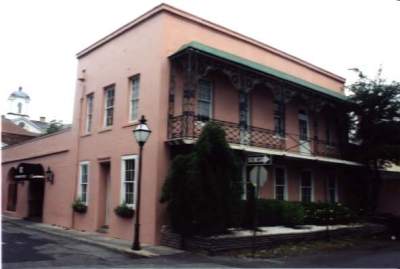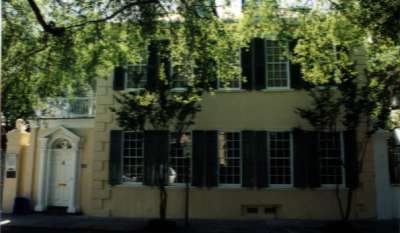


| [ Previous ] [ Next ] |

|
Thanks to John Morrow for sending me a little snippet of Charleston, South Carolina, folklore relating to Banastre Tarleton, which I'll let him tell in his own words:
I wanted to contribute to your "Banecdotes", though understand this is an old Charleston, S.C. story that has been told for many years. I cannot vouch for its authenticity but here goes. When the British occupied Charleston one of the favorite "water holes" was a bordello-restaurant called "PERDITA'S." Here, off-duty British officers dined and enjoyed the establishment "ladies." The most beautiful of these was, of course, the madam. It seems this particular lady physically resembled Mary Robinson, and the establishment came to be called "Perdita's" (after Mary Robinson's character Perdita, from A Winter's Tale). If, today, you visit "Perdita's," in Charleston, you will still find an excellent dining facility in the 18th. C. building but, alas, the damsels are not present (I had my first dinner of escargot here.) True story or not? Who can say? But, as you enter Perdita's, on the left on the scarlet covered walls, the famous dragoon image of Tarleton greets your eyes. And, to his right, across the room, is the lovely Mary Robinson ("Perdita") And now, the funny part: The Daughters of the American Revolution had a past luncheon-meeting at Perdita's some years ago. I'm rather certain they had no knowledge of the place and that (to me) makes it all the funnier!
If true, this story would be a truly outrageous coincidence, given Tarleton's subsequent relationship with Mary "Perdita" Robinson. Its sheer improbability makes it highly suspect, but historical evidence does not immediately rule it out of the realms of possibility.
Mary acquired the nickname "Perdita" after playing that role in Richard Brinsley Sheridan's 1779-season production of Shakespeare's A Winter's Tale (or, a contemporary adaptation of the play by Garrick, Florizel and Perdita.) On December 3, 1779, the play was presented as a Royal command performance, attended by their Majesties King George and Queen Charlotte, and their son, H.R.H. George, Prince of Wales. Prinny took one look at the beautiful actress, and immediately began courting her. Mary soon surrendered to the charms of Royal patronage, and reigned as his mistress for a brief time. Their affair ended acrimoniously during the summer or autumn of 1780.1
The dates make it entirely possible for a British officer to have been in London to see Mary in her most famous (or infamous) stage role, then come to America in time for the siege, surrender and occupation of Charleston. Even those who hadn't seen her in London were probably familiar with Mrs. Robinson's appearance. Her relationship with Prinny played out in the newspapers and scandal rags of the times, and loyal colonial newspapers would have carried it, albeit delayed by the slowness of trans-Atlantic crossings. It is both possible and probable that engravings of the beautiful "Perdita" circulated in Charleston.
As for the rest of the story, well... Like John, I remain highly skeptical, but the anecdote is charming and worth enjoying as a "tall tale."
 Carolina's, formerly Perdita's. The oldest part of the building is in the foreground, with a more modern extension to the rear. |
I was curious about "Perdita's" the modern restaurant, so I went searching for information on-line, in the hopes of trying it out on my next trip to Charleston. Unfortunately, all I found was a restaurant listing which mentioned a place called Carolina's, with the notation "Carolina's is on the site of old Perdita's, a much-respected restaurant of days gone by." I've had dinner at Carolina's since then, and the food is excellent. But nothing at all remains of the interesting decor which John describes.
In my search, however, I did stumble over another piece of related Charleston folklore which can definitely be classified as lacking much historical foundation.
According to this myth, the Perdita of Charleston was Mary Robinson herself, who moved to America after the disastrous end of her affair with the Prince of Wales. She inspired a rivalry between two young men, Delancy and Ladd, which led to a duel that proved fatal for Ladd. The dead man subsequently joined the ranks of the city's ghosts. I saw variations on the tale on a couple of websites, so check the links page and have some fun.
One source for the legend of the duel seems to be an anecdote which appears in Joseph Johnson's Traditions and Reminiscences Chiefly of the American Revolution in the South. Johnson recounts the story of a duel which took place in 1771: "[O]n the 16th of August, an altercation arose, at a genteel house of entertainment in St. Michael's alley, between Dr. John Haley and Delancy, an elegant, accomplished royalist, of New-York, a brother of Mrs. Ralph Izard. Delancy being irritated, probably from being foiled in argument, insulted Dr. Haley[.] ... Haley immediately challenged Delancy to fight with pistols at that house, and proposed that they should go together to an upper room, alone, and without seconds. Delancy accepted the challenge, and the proposed arrangement. He took one of the pistols offered to him by Haley; they fought across a table, fired at the same moment, and Delancy was killed."2
In Johnson's version, Haley -- a Patriot, needless to say -- was eventually tried for Delancy's murder and acquitted. By the time it becomes a ghost story, it's Delancy who wins the duel, and his opponent -- whose name has evolved from Haley to Ladd -- who becomes the ghost. The Delanceys (or De Lanceys) were a prominent New York Loyalist family, with several members playing significant roles in the war. A niece of Oliver De Lancey, Senior, married Ralph Izard in 1767, but I haven't chased the tale any farther to see if she lost a brother to a 1771 duel.
 59 Church Street, haunt of the late Dr. Ladd in one version of the ghost story. |
Some time after I initially wrote up this anecdote, I was in Charleston for a few days, so I decided to take one of the touristy ghost walks. Our guide was an excellent storyteller, and it was a windy, gibbous-mooned night, so it turned out to be quite a bit of fun. "The Whistling Ghost" was, indeed, one of the featured stories, though quite a different version of it. This one lacked Perdita and Delancy, but the ghost was still that of a man named Joseph Brown Ladd. The historical Ladd duel, dating to 1783, is the story of a friendship gone bad, and while there is an actress in it (Miss Barrett), she figures only very peripherally. This variation is recounted in Margaret Rhett Martin's Charleston Ghosts. Ladd really existed, judging by some footnotes to a book written about him in 1832, and was apparently killed by Ralph Isaacs, formerly his friend. (Whether there is anything but coincidence to the similarity between "Ralph Isaacs" and "Ralph Izard" I've no idea.) Again, I haven't tried to backtrack the history any farther than this.3
So the Perdita legend would seem to be a grand mish-mush of a half-dozen different sources, with the most tenuous of connecting links, stewed together in the pot of oral history. Obviously, Perdita Robinson was never in Charleston. By the end of the war her career as an actress was over, even in England, and her whereabouts between 1783 and her death can be tracked. But the legend is another interesting example of the folktale process -- and who can resist a good ghost story?
| [ Index ] | [ Previous ] [ Next ] |
1 Robert D. Bass, The Green Dragoon; The Lives of Banastre Tarleton and Mary Robinson (New York: Henry Holt and Company; 1957), p71, quotes from the newspaper announcement for the royal command performance. Bass, p137ff provides various contemporary newspaper notices of the break-up. [ back ]
2 Joseph Johnson, Traditions and Reminiscences Chiefly of the American Revolution in the South (Spartanburg, S.C.: The Reprint Company, 1972), pp45-47. [ back ]
3 Margaret Rhett Martin, Charleston Ghosts (Columbia, S.C.: University of South Carolina Press, 1963), pp17-29. [ back ]
| Return to the Main Page | Last updated by the Webmaster on January 30, 2004 |